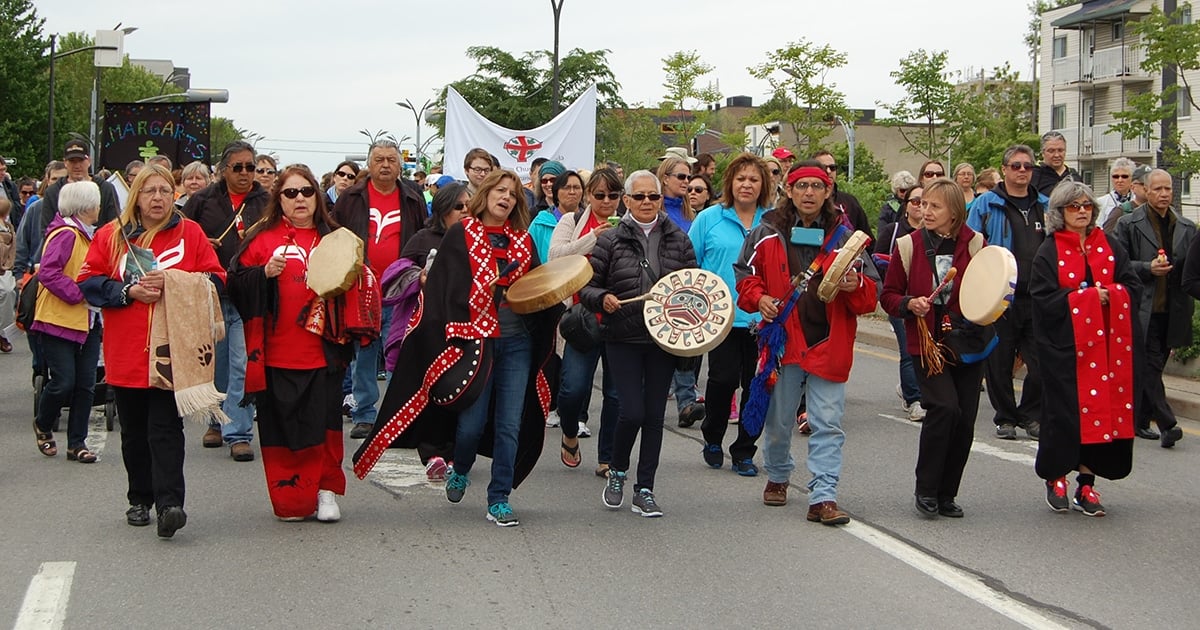Reconciliation has been on the hearts and in the minds of our church for decades. In 2015, the release of the Truth and Reconciliation Commission (TRC) report, the #22Days project, and eighth national Anglican Indigenous Sacred Circle among others further highlighted the issue of reconciliation with Indigenous people, putting it front and centre for and within the Anglican Church of Canada.
Reflecting on survivor testimony and an examination of the Indian residential school system in policy and practice, the TRC was able to determine that history to be nothing short of cultural genocide. The TRC brought to light the traumatic effect of the schools on generations of survivors and their families, as well as the negative social repercussions in Indigenous communities.
“For those who have ears to hear, a conscience to stir, and a heart to move, the Truth and Reconciliation Commission has humbled this nation to confess its sin, and to pray for guidance in walking in a new and different way with the First Peoples of this land,” Archbishop Fred Hiltz, Primate of the Anglican Church of Canada, said in his opening sermon at this year’s Sacred Circle.
The forthcoming federal election offers Canadians—and Anglicans—the opportunity to press political leaders to move forward on reconciliation, one of the 10 issues highlighted in the church’s 2015 election resource, by committing to right relations and equal partnership with the First Peoples of Canada.
“I think the element of hope adds a special kind of urgency to these issues now—the element of hope being that the TRC recommendations, I think, provide a clear-cut way forward on issues,” National Indigenous Anglican Bishop Mark MacDonald said.
“The whole thing out of the TRC really comes across as a beginning and not an end—the beginning of something better, the beginning of a renewed partnership between First Nations and the rest of Canada.”
The Rev. Canon Ginny Doctor, Indigenous Ministries coordinator, put reconciliation in the context of the Marks of Mission—particularly its exhortation “to seek to transform unjust structures of society, to challenge violence of every kind and to pursue peace and reconciliation”—by pointing to its positive effect on generations to come.
“Certainly, we want a better place for our children and grandchildren, nieces and nephews and great-grandchildren and great-great-great-great grandchildren to live,” Doctor said.
“I would hate to see any of my great-nieces and nephews have to have a residential school experience like they had in the past … Yet it’s a part of history that they need to know about too … I’m grateful that they’re calling for education in schools around the residential school situation.”
“To me, it’s all about making a better life, and how as Christian people, that’s what we’re called to do,” she added. “Otherwise, why are we Christian?”
The Anglican Church of Canada is urging church members to ask party leaders what they would do to implement the recommendations of the TRC.
One of the most important Calls to Action is the establishment of a national inquiry into missing and murdered Aboriginal women.
“I think the things that are blocking the inquiry, the things that create the problem in the first place, are a matter of systemic prejudice, discrimination and injustice,” Bishop MacDonald said.
“The inquiry would not only give insight, [but] I think that by creating the capacity for truth-telling on these issues would make a big difference.”
As a framework for reconciliation, the TRC calls upon federal, provincial and territorial governments to “fully adopt and implement” the United Nations Declaration on the Rights of Indigenous Peoples.
A key element of the declaration is the concept of Indigenous peoples providing their “free, prior and informed consent” to actions that affect them, such as resource extraction.
“Free, prior and informed consent is the cornerstone of applying the basic human rights that all people have to the particular and unique situation of Indigenous people,” Bishop MacDonald explained.
“It’s not the creation of a special category, a special right,” he said. “It’s just a way of underlining the unique situation of Indigenous people and their relationship to other societies like Canada. So free, prior and informed consent is the absolute minimum that can be done in terms of Indigenous justice and Indigenous rights.”
If the work of the TRC toward reconciliation focused on establishing the truth about Canada’s past, the ongoing journey of healing will require educating future generations on residential schools, treaties and the history of Indigenous peoples.
Self-determination for Indigenous education will be a critical part of that change, Bishop MacDonald noted.
“I think that the educational system has to change the way it treats the history of Canada relative to Indigenous people,” he said. “But I think it also needs to address the ongoing inequities of how education is funded and brought to Canada, and the present situation of educational funding clearly represents a structural discrimination against Indigenous people.”
View the 2015 federal election resource sheet on reconciliation.
Interested in keeping up-to-date on news, opinion, events and resources from the Anglican Church of Canada? Sign up for our email alerts .

